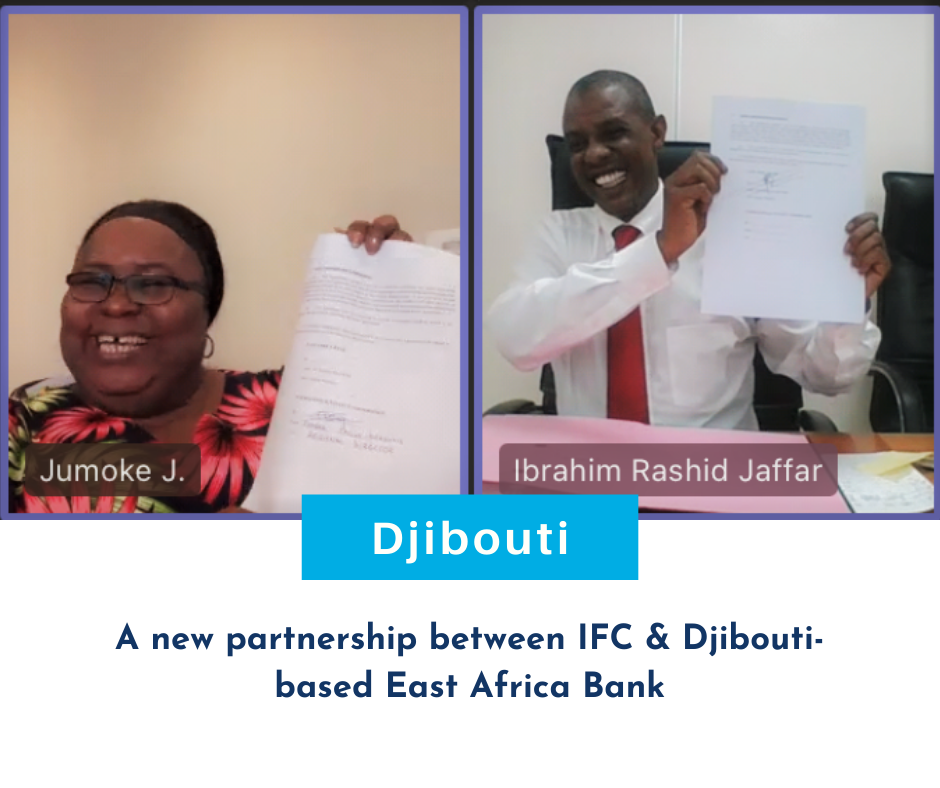Djibouti City, Djibouti, Wednesday, June 23, 2021 — Supporting a vital engine of economic growth that has been strained by the COVID-19 pandemic, IFC today announced a trade finance guarantee facility to Djibouti-based East African Bank to help local companies engage in cross-border trade.
IFC’s trade finance facility guarantee of up to $5 million under its Global Trade Finance Program (GTFP) will help EAB provide financing to importers and exporters in Djibouti, supporting the local economy and helping maintain the flow of essential goods into the country, including medical equipment and commodities. IFC’s support to EAB is underpinned by the International Development Association’s Private Sector Window (IDA PSW), which is providing first-lost guarantees and limit enhancements to the GTFP in low-income countries.
Djibouti’s cross-border trade is largely facilitated through its international port, located at the crossroads of one of the busiest shipping routes in the world. Despite its strategic location, a lack of corresponding banking relationships continues to hamper the country’s financial services and trade.
The facility announced today follows an advisory services agreement signed in April 2021 between IFC and EAB that is helping strengthen EAB’s risk, trade, and credit management framework and capacities in line with international best practices.
“We are delighted to partner with IFC in the GTFP and appreciate the role played by the board of directors and management and staff of EAB in making this a reality,” said Ibrahim Jaffar, CEO of East Africa Bank. “Thank you to all parties from IFC who conducted due diligence, trained our staff, improved our compliance environment, and approved this program as a vote of confidence in our capability to continue serving the economy by increasing the flow of trade globally,” he added.
IFC’s partnership with EAB will guarantee trade-related payment obligations. Through our trade program, banks can support the smooth flow of trade globally as trade is a key driver of economic growth and contributes to job creation and poverty reduction,” said Cheick-Oumar Sylla, IFC’s Country Manager for Djibouti.
Through IFC’s GTFP bank network, local financial institutions can establish partnerships with major international banks to broaden access to finance and reduce cash collateral requirements. This enables the continued flow of trade credit into the market when imports may be critical, and the country’s exports can generate much-needed foreign exchange.
As of the end of fiscal year (FY) 2020, IFC’s GTFP had covered over 68,000 trade transactions and supported over $66.5 billion in emerging market trade, without a single loss since inception in 2005.
In addition, as part of the IDA-PSW COVID-19 response, in FY2020, GTFP supported over $3 billion in trade in low-income countries.
About East Africa Bank
Launched in 2010 and licensed by the Central Bank of the Republic of Djibouti, East Africa Bank was established to consistently deliver high quality financial products and services in the interest of all our stakeholders, through best business practice in the dynamic markets in which we operate. For more information, visit https://eastafricabank.com
About IFC
IFC—a member of the World Bank Group—is the largest global development institution focused on the private sector in emerging markets. We work in more than 100 countries, using our capital, expertise, and influence to create markets and opportunities in developing countries. In fiscal year 2020, we invested $22 billion in private companies and financial institutions in developing countries, leveraging the power of the private sector to end extreme poverty and boost shared prosperity. For more information, visit www.ifc.org
About the IDA Private Sector Window
As part of the record $75 billion IDA18 replenishment, the World Bank Group created the $2.5 billion IDA Private Sector Window to catalyze private sector investment in the poorest and most fragile countries. Recognizing the key role of the private sector in achieving IDA18 objectives and the Sustainable Development Goals, the window provides concessional funds for co-investment alongside IFC and Multilateral Investment Guarantee Agency (MIGA) private investments. Concessional funds help to mitigate risk and reduce barriers, which unlocks and crowds in private investment in emerging markets. For more information, visit: https://ida.worldbank.org/psw


